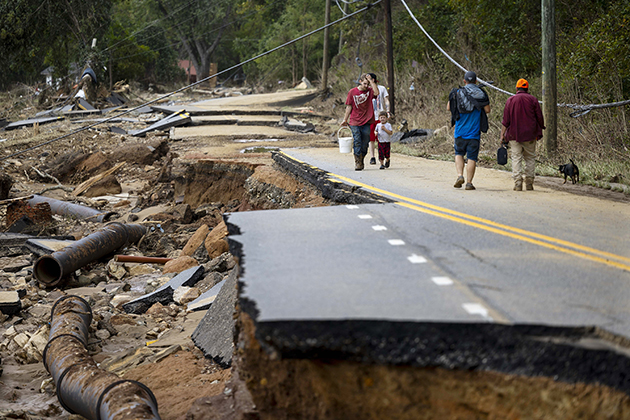S&P Global Offerings
Featured Topics
Featured Products
Events
S&P Global Offerings
Featured Topics
Featured Products
Events
S&P Global Offerings
Featured Topics
Featured Products
Events
Banking & Capital Markets
Economy & Finance
Energy Transition & Sustainability
Technology & Innovation
Podcasts & Newsletters
Banking & Capital Markets
Economy & Finance
Energy Transition & Sustainability
Technology & Innovation
Podcasts & Newsletters
S&P Global Offerings
Featured Topics
Featured Products
Events
30 Dec, 2024
By Karin Rives

| The community of Swannanoa, North Carolina, was devastated by flooding from the remnants of Hurricane Helene in late September 2024. As of mid-December, the state estimated Helene's total damages at nearly $60 billion. |
Violent weather will cost the US economy more than $500 billion in insured and uninsured losses in 2024, according to experts with the weather forecasting company AccuWeather.
The total cost of the nine most significant weather events in the US through December, including Hurricane Helene, equaled nearly 2% of the country's gross domestic product, AccuWeather estimated in a Dec. 26. report.
"We witnessed a historic year of extreme weather in America," Jonathan Porter, AccuWeather's chief meteorologist, said in a statement, noting that the 2024 US hurricane season was one of the most expensive in modern history.
"More and more people, businesses and communities are feeling the direct impacts and harm from extreme weather and climate change," Porter said.
In western North Carolina, Duke Energy Corp. has restored power for all customers who suffered catastrophic flooding in late September with buildings capable of receiving service. Utility executives have said the company's total damage from Helene and two other hurricanes that hit its service territories in 2024 could reach $2.9 billion.
Duke Energy used "strategic resource staging, helicopter and drone operations, mobile substation deployments [and] advanced mapping techniques" in cooperation with government partners in North Carolina to restore power to the hardest-hit areas faster than expected, a company spokesman said in an email. The utility stands ready to reconnect customers as damaged buildings are repaired, the spokesperson said.
North Carolina estimated in mid-December that the overall damage within its boundaries is more than $59.6 billion and that more than 5,100 homes may be rebuilt.
The impact from Hurricane Helene extends to other states as well.
The US Census Bureau said 56% of companies in the Houston area reported weather-related losses during the second half of July following Hurricane Beryl. Earlier in the year, nearly one-third of businesses in Tennessee said they suffered losses due to severe winter storms. The Census Bureau started asking business about the monetary impacts from extreme weather events in 2023.
Duke Energy on Dec. 27 asked the Florida Public Service Commission for a $1.1 billion rate increase to cover 2024 hurricane costs in the Sunshine State. If approved, Florida residential ratepayers' monthly utility bills would increase by about $21 per 1,000 kWh of electricity in March 2025 as compared to February 2025, the company said.
The cost of extreme weather events will continue to rise, UK-based World Weather Attribution said in a separate Dec. 27 report. Nearly all such events tracked by its scientists globally in 2024 were made more intense by rising temperatures caused by the continued burning of fossil fuels, the report said.
In drought-stricken western Canada, for example, the wildfire season destroyed one-third of buildings in the popular tourist town of Jasper and caused an estimated $208 million in damages, according to the Center for Disaster Philanthropy. And in West Africa, deadly early-season heat waves were about 10 times more likely because of climate change caused by humans, the World Weather Attribution report said.
European scientists recently declared 2024 the hottest year on record and the first full year with average temperatures 1.5 degrees C above pre-industrial levels, the threshold set by the Paris Agreement on climate change.
